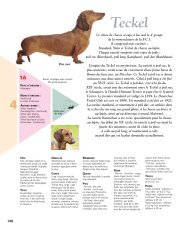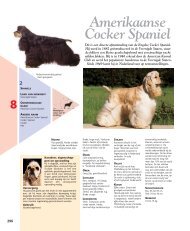Specific breed brochure - Breed Nutrition
Specific breed brochure - Breed Nutrition
Specific breed brochure - Breed Nutrition
You also want an ePaper? Increase the reach of your titles
YUMPU automatically turns print PDFs into web optimized ePapers that Google loves.
© Bussadori<br />
A heart function that requires<br />
monitoring<br />
Large dogs are less affected by degenerative heart disease than small dogs, although there is a<br />
real risk of heart pathology. It is said to be 3.7 times higher in the former than in the dog population<br />
as a whole (Deeb and Wolf, 1994).<br />
Heart diseases that may be encountered<br />
<strong>Breed</strong> predispositions to cardiovascular disease have been identified in Rottweilers. The most common<br />
heart diseases are subaortic stenosis (Manczur, 2003) and dilated cardiomyopathy (Sisson et<br />
al, 2000). The <strong>breed</strong> was also very well represented in a study on atrial fibrillation (Menaut et al,<br />
2005), a very common heartbeat problem among dogs suffering from dilated cardiomyopathy.<br />
The risk of subaortic stenosis is 5.4 times higher among Rottweilers (Gough and Thomas,<br />
2004). This disease is characterised by lesions of the aortic valves that disrupt the flow of arterial<br />
blood, creating a specific heart murmur. There may be no clinical signs and the diagnosis is made<br />
during routine auscultation.<br />
Ultrasound showing<br />
dilated cardiomyopathy<br />
in a large-<strong>breed</strong> dog<br />
VG<br />
AG<br />
A right<br />
parasternal long<br />
axis view shows<br />
the dilatation of<br />
the left atrium<br />
(AG) as well as<br />
the spherical<br />
shape the left<br />
ventricle (VG)<br />
tends to assume.<br />
16<br />
Dilated cardiomyopathy (CMD) is<br />
the second major heart disease affecting<br />
Rottweilers. This disease is characterised<br />
by the large-scale dilatation of the heart<br />
cavities, together with thinning of the<br />
muscle wall. Ultimately, the myocardium*<br />
is unable to contract enough to<br />
pump blood around the body.<br />
Rottweilers probably have a genetic predisposition<br />
to DCM, although the disease<br />
is often linked to too low a plasma<br />
taurine and/or L-carnitine level.
















